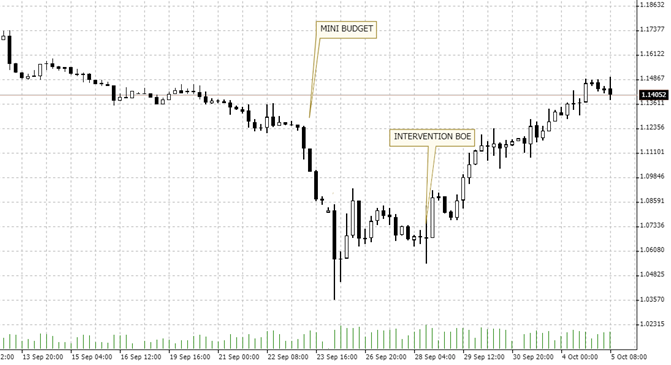

05.10.2022 – British capers: Under pressure from domestic pension funds, the new British Prime Minister Liz Truss has again capped her just-announced tax plans. As it stands, the British financial system was on the verge of collapse last week.
Sterling currently offers a laid table for traders with the right nose – here is the four-hour chart. 10 Downing Street has just reversed the abolition of the top tax rate under pressure from its own party. The problem for the market with the Mini Budget presented by Truss was this: It was not clear from the government’s proposals exactly how the plans to cut taxes and the £45 billion in lost government revenue were to be counter-financed. In other words: new debts.

Source: Bernstein Bank GmbH
Now the prime minister is taking the plunge. According to the BBC, the presentation of the budget is to be brought forward from the end of November to October. This is intended to reverse the decline in the value of British gilts and stabilize the pound. The market urgently needs new confidence now.
London on the brink of financial meltdown
According to “Wirtschaftswoche,” the City of London was on the verge of a Lehman moment last week: pension funds, as a mainstay of retirement provision, often promise investors a fixed annual payout. And to be able to afford this, the funds usually invest a good portion of their assets in domestic fixed-income securities. In addition, they hedge with swaps. In technical jargon, this is called liability-driven investing (LDI).
Margin calls at pension funds
The problem: Many pension funds additionally leverage their LDI with debt. And this leverage almost became the undoing of large funds: If the prices of government bonds fall too quickly and too deeply, the funds have to add collateral because leveraged positions are then in the red. That’s exactly what happened after the tax cut plans were announced in the Mini Budget: the yield on ten-year gilts shot up from around 3.5 to around 4.5 percent. Ergo, according to British media, at least three pension funds suddenly faced margin calls of around 100 million pounds each. But no one wanted to buy up repossessed bonds, which were supposed to be used to raise money for the LDI.
Massive intervention
Finance Minister Kwasi Kwarteng therefore gave the green light for a larger intervention than previously known, according to Bloomberg. The Bank of England wanted to use only 65 billion pounds, ultimately it shot 100 billion pounds into the market.
The conclusion for traders and investors is that the events in London may be a beacon for the rest of the world. De facto, the Bank of England has returned to quantitative easing by buying bonds. Other central banks could follow suit. After all, no one wants to risk systemic collapse. Tax cuts and the end to bond purchases are unlikely to go away until inflation has been tamed and the risk of recession has been averted, according to the market. That is unlikely to be the case in the UK for a long time yet. Just as an aside, there is the question of how long Truss can hold on – she is not an Iron Lady after all, although she invoked a new Thatcherism. Now Britain is threatened with a return to a socialist debt policy. We’ll keep an eye on the Sterling situation and wish her every success!
The content of this publication is for general information purposes only. In this context, it is neither an individual investment recommendation or advice nor an offer to purchase or sell securities or other financial products. The content in question and all the information contained therein do not in any way replace individual investor- or investment-oriented advice. No reliable forecast or indication for the future is possible with respect to any presentation or information on the present or past performance of the relevant underlying assets. All information and data presented in this publication are based on reliable sources. However, Bernstein Bank does not guarantee that the information and data contained in this publication is up-to-date, correct and complete. Securities traded on the financial markets are subject to price fluctuations. A contract for difference (CFD) is also a financial instrument with leverage effect. Against this backdrop, CFD trading involves a high risk up to the point of total loss and may not be suitable for all investors. Therefore, make sure that you have fully understood all the correlating risks. If necessary, ask for independent advice. CFDs are complex instruments and are associated with the high risk of losing money quickly because of the leverage effect. 68% of retail investor accounts lose money trading CFD with this provider. You should consider whether you understand how CFD work and whether you can afford to take the high risk of losing your money.7
